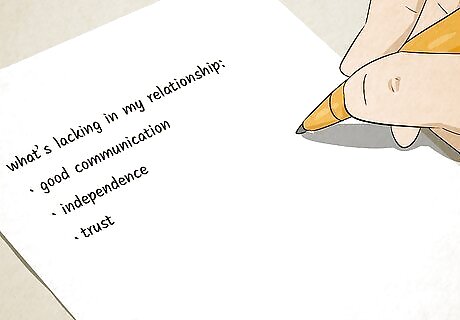
views
- Love bombing is a type of emotional manipulation that’s often used by narcissists to overwhelm you with affection and attention so you become dependent on them.
- If your partner seems to “need” you, says they can’t live without you, and goes out of their way to impress you with praise, it’s a sign you’re being love bombed.
- Prevent love bombing by asking your partner to slow down if they’re rushing in the relationship and by clearly stating your boundaries, like a need for space.
- Avoid love bombing someone by allowing a relationship to naturally develop and by asking your partner if they feel comfortable with the way you express affection.
What is love bombing?

Love bombing is the use of affection as a form of manipulation. “Love bombing” is a strategy used to win a romantic target over by overwhelming them with a distracting amount of adoration, like a daily stream of gushing texts, early on in a relationship. While it might be nice to receive all that praise and attention, when someone is "love bombed," they usually become emotionally dependent on a partner. "Love bombing" can also be used as a way to distract a significant other from abuse in toxic relationships. The first steps in normal dating look different from love bombing that happens early on in a relationship. For example, in an everyday situation, you might get a nice text after dinner, while a love bomber may surprise you with a gold bracelet. Love bombing is a common tactic narcissists use because it helps them get their "supply" or people who obsess over them. A toxic person may put you through cycles of love bombing and "devaluing," or degrading or ignoring you so you come to depend on their "love" and approval.
Signs of Love Bombing

Over-the-top gestures are clues that you're being love-bombed. Usually, an emotional manipulator will dazzle you with claims that you're "the one" even if you've only had one date. They'll charm you so much during the "idealization" stage—when they apparently worship you—that it may be hard to believe they're trying to control you. To protect yourself, watch out for: Excessive flattery Extravagant gift-giving Extreme declarations of love Constant contact via texts and phone calls Claims you should rush to commit right away Overwhelming emotional neediness A refusal to accept boundaries
How to Prevent Love Bombing

Set boundaries right away to assert your independence. One of the best ways to tell a narcissist or an emotional manipulator that you aren’t easily fooled is to speak up. Share your romantic expectations and establish your boundaries. Be clear that you want a healthy dynamic and that you identify red flags in relationships instead of ignoring them. Set a boundary in the early stages of a relationship with a comment like, “I have a very busy schedule, and I’m not able to drop everything for a romantic partner. I can only hang out once a week.” Share what a sustainable partnership looks like to you. For example, say, “I want to date someone who is reliable. All the bells and whistles of romance are less important than consistency.” Point out you’re aware of red flags associated with love bombing. You might make a remark like, “If someone tells me that we should move in with each other after four months, I know that they’re trying to rush a commitment.”

Ignore an ex who tries to love bomb you to win you back. If you were mistreated in a past relationship, then your former partner might try to woo you with romantic texts and gestures. While it might be tempting to date them again, be aware that love bombing is usually just a narcissist's ploy to have control over you again. Go "no contact," a strategy that involves stopping all communication with a narcissist so they can't play with your heart. Respond to a narcissist's texts by being clear and firm. Let them know you want to move on with a message like, "For the sake of my own healing, I no longer want to stay in touch. I wish you the best." Since your ex might try to make you feel vulnerable by saying something like you're both "destined" to be together, focus on practicing self-care and developing resilience so you aren't emotionally dependent on them.

Learn to recognize and steer clear of narcissists. If you’re just starting to date, filter out people who seem superficially charming or arrogant. Maybe they look great on social media and are well-spoken but they only seem to brag. If your current partner is a master at romantic gestures but doesn’t express a lot of empathy, that’s also a sign you may be with a narcissist. Consider severing ties since they may exploit you later. For example, your significant other might post a picture of the gorgeous bouquet they bought you, but they rarely listen when you speak. A person you agreed to grab coffee with may ask to see you three more times that week, then get offended when you tell them you’re busy.

Test your partner by politely refusing their gifts and judge their reaction. Give this person a chance to adjust their behavior—maybe they just came on too strong. In order to determine the difference between love bombing and a harmless rush of excitement, gently tell this individual that it’s too soon for such an extravagant gesture. Watch how they react to your request to slow down to see if they’re safe to date. For example, if it’s just your second date and they ask to take you on a cruise, say, “This is very sweet, but I think it’s a little too soon for me.” If they try to convince you to take it, then they’re not respecting your boundaries. Be wary of gifts that an ex gives you, from small tokens to impressive mementos. Remind them to respect your space with a comment like, “It’s really best if we continue to go without contact. Please respect my need to move on.”

Be clear about your definition of “real” love. While it’s easy to get swept away with love bombing, you’ll be able to resist it if you’re firm about your own unique standard of love. Think about signs of a healthy relationship and see how your current situation measures up. Does it feel intoxicating but also unsettling? If so, that’s a clue that it’s toxic. One standard of love might sound like, “We respect each other’s independence and understand date nights need to be rescheduled if work gets too hectic.” You may also value your overall wellness and say, “I should feel relaxed and confident in a relationship, but lately, I always feel tired, worried, and stressed out.” Maybe you’re really concerned about practical matters and point out, “I want someone who’s emotionally invested in my son—I don’t want to go on romantic vacations all the time.”

Make a checklist of what’s lacking in your relationship. Maybe your partner dazzles you with roses and getaways, but they also speak dismissively and put down your dreams. When you focus less on the “shiny” parts of your dynamic and pay attention to the cons, like mistrust, poor communication, and a lack of independence, it’ll be easier to spot love bombing. Consider what seems like a “plus” but is actually a red flag. For example, if your partner wants to stay in contact all the time, it may seem like clear communication. However, if you review your texts, you might notice all the chats are stressful and one-sided.

Consider if the connection is sustainable long-term. While you might be blown away with your whirlwind romance, ask yourself—do you want this dynamic on a daily basis? Will a flood of adoring texts or all those gifts make you happy five years from now? If your partner holds out on the little things, like basic empathy, but makes a big show of how “generous” or “worshipful” they are, make a judgmental call about whether that’s the future you want. Does this person represent who you want to be with in the future? If you think their behavior would be charming for about a week at most, then it’s a sign you should reevaluate your connection.

Share your concerns. Before you take drastic measures, focus on communicating better in your relationship. Tell them what impacts you and give them a chance to respond. Try something like, “I really like you, but I’m a person who needs more space and alone time for myself. Are you okay with that?” If the relationship is healthy, then your partner will respect your boundaries and appreciate that you took the time to communicate your reservations. If you’re a target of true love bombing, then your partner will probably not respond well. They may even get defensive and insist on you accepting their behavior.

Ask someone you trust if they’ve noticed any love bombing. Sometimes, it can be hard to spot red flags, especially if you like someone new or you’re attached to your partner. Seek out a third party perspective from a person who’s close to you, like a friend or family member. Describe your relationship and see if anything raises their suspicions. Since your loved ones are protective of you, they may be very straightforward about subtle situations you might’ve missed. For example, they might point out, “They said you felt like their soulmate when you just got out of a relationship! Talk about bad timing. Way too soon.”

Leave the love bomber, even if it’s difficult. While you might still have feelings for this person or just experience guilt for “abandoning” them, remember to love yourself first. If you’re concerned about your mental health and of being taken advantage of, then it’s best to end a relationship with anyone emotionally manipulating you. If they’re truly a narcissist, then you’ll spare yourself a lot of heartache by walking away sooner rather than later. Love bombers might paint you as the “villain” for ending the relationship, but it’s best to move on and lean on your support network. Remember that people with a history of love bombing or narcissistic tendencies rarely stop their emotionally abusive behavior on their own.

Seek professional help to cope with love bombing. If you book a session with a therapist, this trained expert can confirm if you’ve encountered a narcissist or a manipulative individual. If they do see a cause for concern, they’ll be able to provide personalized strategies to help you heal from emotional abuse. A therapist can guide you through processing your emotions and unpacking love bombing so you aren’t re-traumatized. When you discuss your background and childhood experiences, a mental health expert can help you understand how a lack of attention of affection might’ve made you more vulnerable to love bombing. During your sessions, you’ll focus on how to strengthen your self-esteem and boundaries rather than on moving on to a new relationship.
How to Avoid Love Bombing Others

Do some self-reflection if you’ve been accused of love bombing. While love bombing can be harmful to relationships, it’s a tough habit to break. Experts say that these types of behaviors are learned; for example, you might’ve been inspired by a past relationship or from observing your parents. The most important thing you can do is recognize that love bombing has a negative impact and then work to avoid falling into the same patterns. If you suspect yourself of being a love bomber, there’s no reason to despair. Just the fact that you can recognize this in yourself is a huge step forward. When you single out a past incident of love bombing, like declaring someone is your perfect match after a first date, you’ll be able to express yourself in a more level-headed way. For example, you can just mention you feel a lot of chemistry.

Evaluate any toxic patterns you'd like to change. While it's completely understandable to want an exciting romance, consider whether you've intentionally or unwittingly manipulated someone to win them over. For example, do you "mirror" or copy all their interests so they feel like you're both a perfect match? Think about a more honest approach to dating—in this case, discuss your goals and passions, even if they're different. When you're authentic, you'll find you don't need love bombing at all and can just be yourself. Focus on healthy alternatives to love bombing. For example, you might tell yourself, "Instead of showering Charlie with a ton of compliments, I'll send just one text asking what she wants to do over the weekend so we can have a good time." Self-reflect and consider whether you're condependent, which means that you rely on a partner for approval. If you think you do, then work on being happy even when you're alone.

Communicate with your partner. Ask them if your behavior is too much–or harmful–and do your best to resist getting defensive if they say yes. It’ll take a lot of willpower, but it’ll also be an important way to show your significant other some empathy. If it’s too difficult to accept feedback from your partner, then it may not be a good time for you to be in a relationship. Try asking them something like, “I really want to be a great partner. How can I be better?” Be prepared to make some changes–no one is perfect, and making personal changes is healthy and normal. Be vulnerable and admit to some toxic habits. For example, say, “Hey, I realize that I may have been blowing up your phone this week. I’m sorry about that, I just really enjoy talking to you–but I totally understand if you think it was too much.” If your partner is concerned that they're experiencing less independence in the relationship, discuss how you can respect their autonomy. They might want alone time or more opportunities to see their friends.

Slow yourself down whenever you’re tempted to rush things. There is definitely a difference between being a love bomber and just coming on too strong. The latter is very easy to fix, especially if you commit to a steady pace. For now, just focus on building rapport and getting to know the person you're dating. Take heart in the fact that there’s plenty of time to buy your new romantic partner gifts, and if you maintain a healthy relationship, then you’ll have lots of opportunities to bond in the future. Remember that people feel love in different ways; just because you like to move quickly and intensely doesn’t mean everyone does. Simply appreciating that someone is in your life without having any expectations or giving them excessive praise is a great way to avoid "clingy" behavior. To handle the early stages of a relationship, instead of love bombing, just stay curious and ask the person you're dating questions to show you're engaged. Through communication, you can both show affection using different love languages and find a happy balance.

See a therapist, especially if you have a history of love bombing. Remember that you can always change! Seeing a therapist can help you break the cycle of toxic relationships, focus on healing, and improve your life–and those who you are in relationships with.



















Comments
0 comment